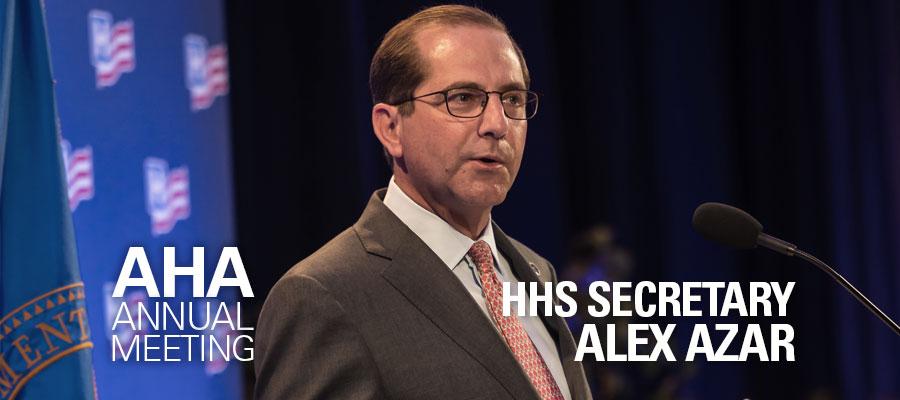HHS Secretary Alex Azar Addresses AHA Annual Meeting

Watch the video
Department of Health and Human Services Secretary Alex Azar today at the AHA Annual Membership Meeting in Washington, DC, laid out the department’s four areas of emphasis for creating a value-based health care delivery system and urged hospital and health system leaders to help accelerate progress.
“I believe we’re in an exciting moment for health care – a time when we all agree that change has to come to this industry faster than it ever has before,” said Azar, speaking at a special forum.
Citing improvements hospitals have made in innovating new treatments, improving outcomes, lowering costs, and moving care outside of their four walls and into the community, Azar noted that, although the transformation to a value-based system is underway, the pace needs to quicken.
“Getting to that system won’t be easy or the most comfortable process,” Azar said. “…But America’s hospitals have already shown a willingness to change and innovate – that process just needs to accelerate, and we want to work with you to make that happen.”
Azar laid out four areas of emphasis for the department: maximizing the promise of health information technology; improving both quality and price transparency; innovating new models of care; and reducing regulatory burden.
[For additional highlights from the AHA Annual Membership meeting, click here.]
On health IT, Azar related a story of his own recent hospitalization when stressing the need for interoperability of health information.
“We at HHS don’t want to micromanage how the system gets to interoperability, but we are going to provide the right incentives to make it happen,” he said, noting the efficiencies that could be achieved and the improvements that could be made to patients’ health care experiences with true interoperability.
Azar also emphasized that patients must have access to more than just their own health data. “For individuals to drive value, they must have access to data on price and quality,” he said, citing a recent HHS proposal to require hospitals to post online a list of standard charges in a machine-readable format as one way the department is playing a role in driving broader change. He noted that the rule also contained a request for information on the types of pricing information consumers would find most useful.
“I believe you ought to have the right to know what a procedure is going to cost, and what it’s going to cost you, out of pocket – before you get it,” he said. “We want your input on the best way to make this a reality, and we will applaud those who make this vision a reality on their own.”
On driving new models of care, Azar said that HHS is going to “think big and bold,” using the Center for Medicare and Medicaid Innovation to transform not just Medicare and Medicaid but the health care system as a whole.
Azar also highlighted steps HHS has recently taken to reduce regulatory burden, such as its new “Meaningful Measures” program, saying a larger regulatory reform package is in the works.
“[W]e are well aware of the huge burden that regulation places on so many health care professionals, and we are working to reduce that burden where we can,” he said, calling the forthcoming package a “major step forward for patients and providers.”
Azar also placed special emphasis on the need to pay close attention to health care in rural areas, citing the rural health strategy released yesterday by the Centers for Medicare & Medicaid Services.
“We know rural hospitals in particular are a lifeline for the nearly one in five Americans who live in rural areas, and we’re committed to maximizing the promise of technology and building new partnerships to improve care across our country,” he said. “This will require novel approaches to care delivery and coordination, and we must ensure we are not standing in the way of needed innovation.”
Finally, Azar discussed taking action to bring down the high prices of prescription drugs, saying President Trump “believes it is a top priority to build a system that puts American patients first.” The president is expected to make an announcement Friday on steps the administration will take to address the issue. Azar said HHS’ blueprint on drug pricing will build on proposals included in the president’s recent budget request and noted that the president “wants to go much, much further.”

